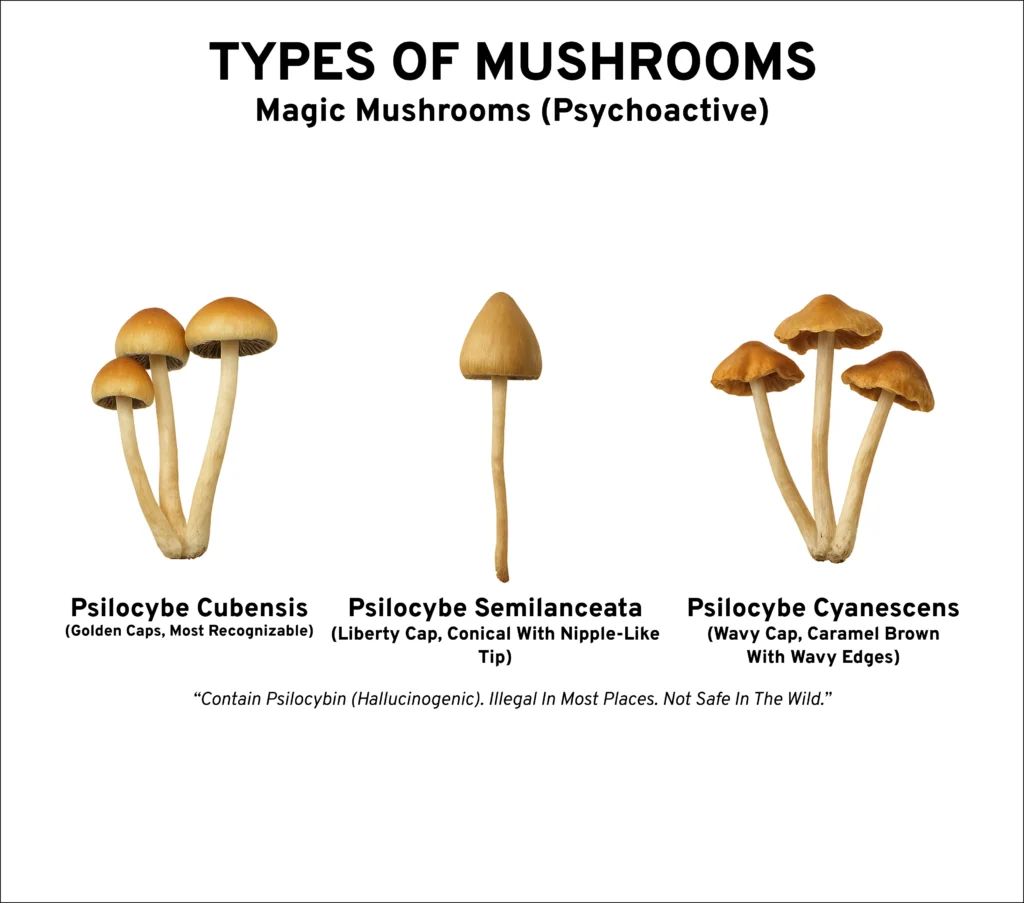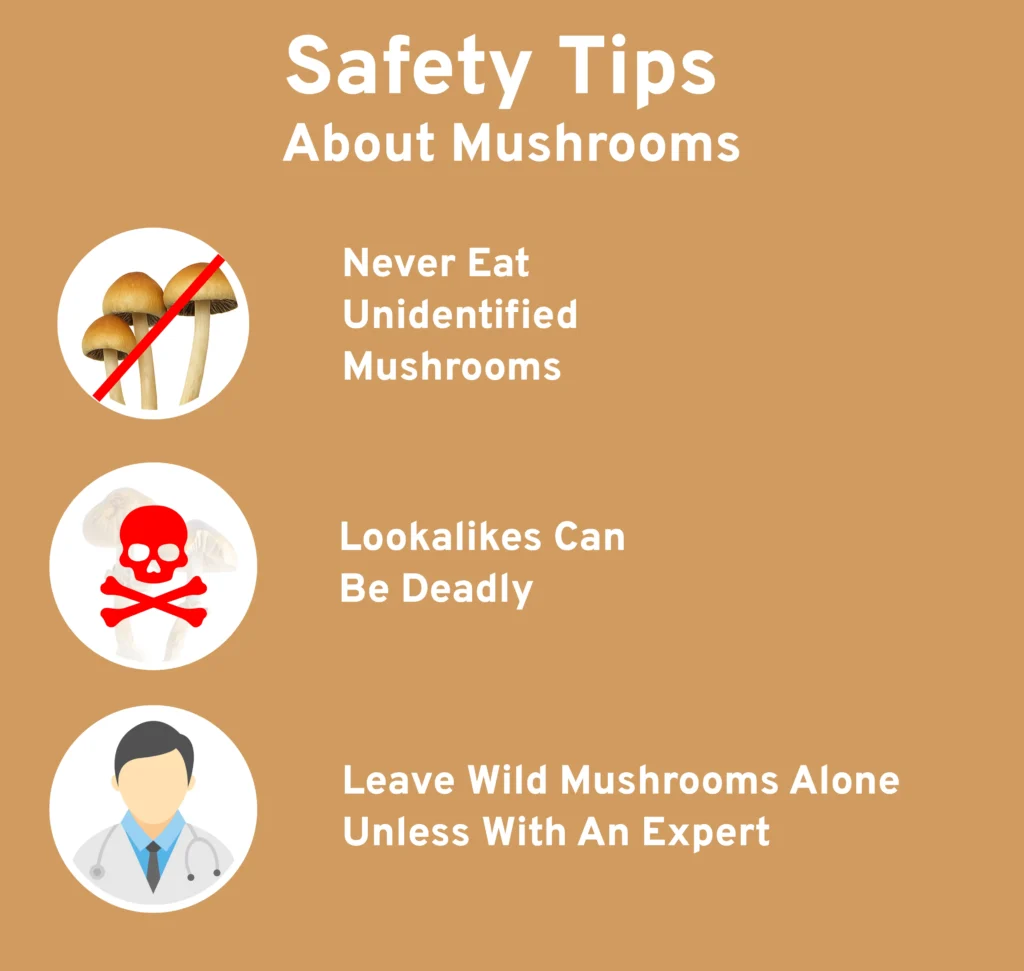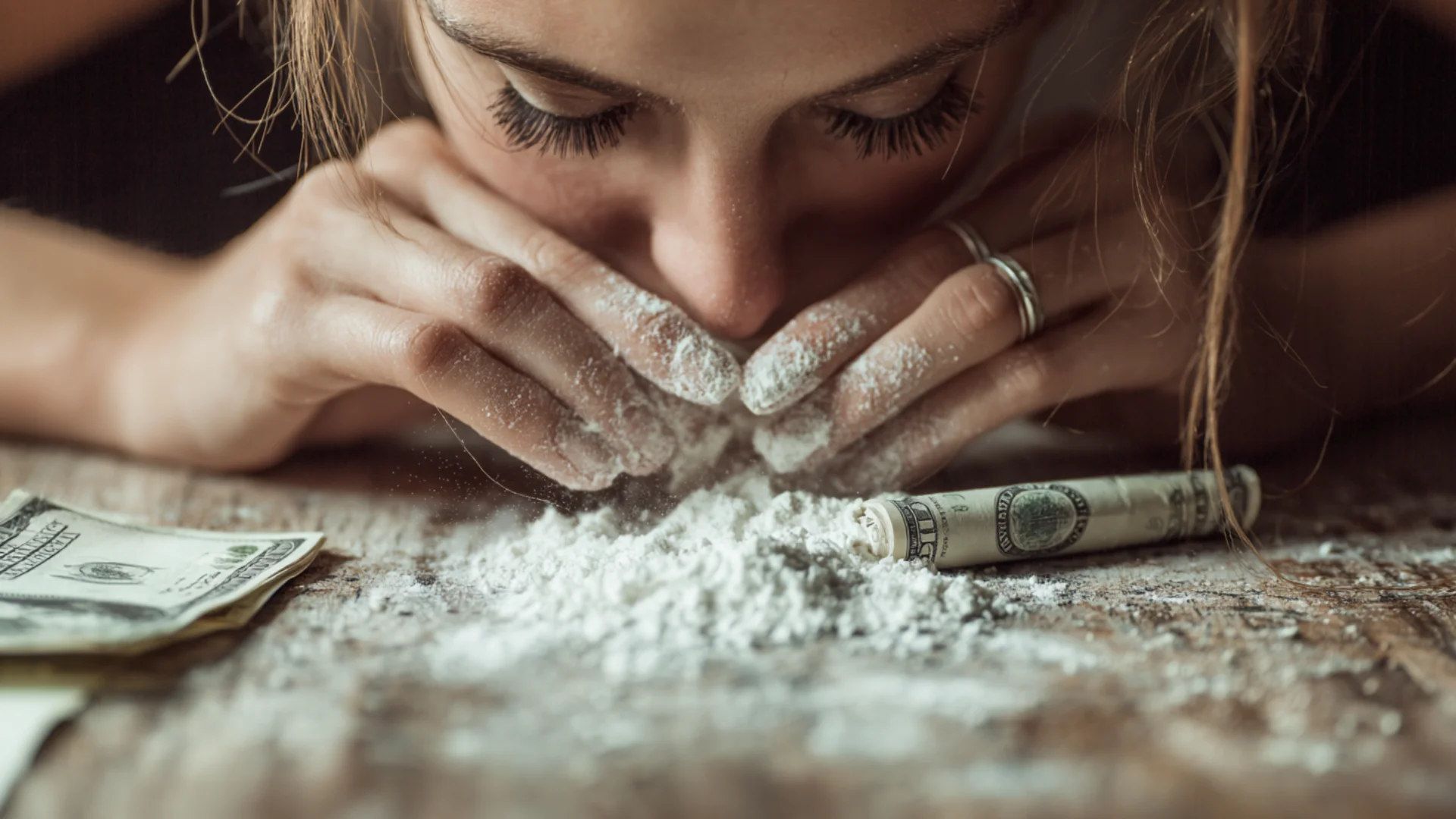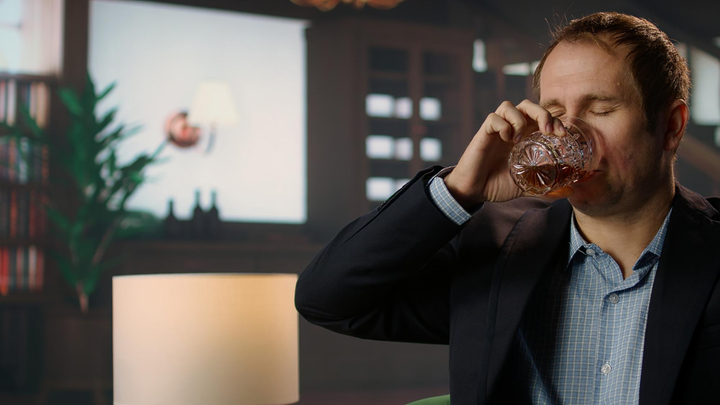If you’ve ever heard someone mention “shrooms,” “magic mushrooms,” or “boomers” at a party or online, you already know they have a reputation. These small fungi, often eaten raw, brewed as tea, or mixed into food, pack a powerful punch thanks to psilocybin, a natural compound that changes how your brain works.
But here’s the big question: are shrooms addictive? People are curious because psychedelics are becoming more mainstream in conversations about mental health and self-discovery. While some studies highlight possible therapeutic benefits, mushrooms still come with risks you can’t ignore.
Here’s the truth: while magic mushrooms are not typically addictive in the same way as alcohol, nicotine, or opioids, that doesn’t mean they’re entirely risk-free.
Quick take: Magic mushrooms aren’t physically addictive like alcohol, nicotine, or opioids, but that doesn’t mean they’re risk-free. While some people may develop psychological dependence (using sh-rooms to cope or escape), true chemical addiction is rare. The bigger dangers come from bad trips, poisonous lookalikes, and mental health flare-ups.
What exactly are psilocybin mushrooms?
Magic mushrooms are a group of fungi that contain psilocybin, which your body converts into psilocin, the chemical responsible for altering your mood, perception, and sensory experiences.

Street names for psilocybin shrooms include:
- Magic mushrooms: the most widely recognized term.
- Boomers: popular in psychedelic circles.
- Liberty Caps: refers to a specific species of psilocybin mushroom.
- Mushies: a casual nickname often used by younger users.
- Blue Meanies: slang for a stronger psilocybin strain that can cause intense trips.
- Golden Tops: referencing the yellowish cap of some mushroom species.
Ways people use them:
- Eating Them Raw or Dried – the most straightforward method; eating dried shrooms often results in stronger effects since the psilocybin is more concentrated.
- Brewing Them Into Tea – some users boil shrooms into a tea to mask the earthy taste and reduce nausea, which can occur when eating them directly.
- Mixing Them With Food or Chocolate – incorporating mushrooms into food helps disguise the bitter taste; chocolate shrooms are especially popular.
- Capsules or Powdered Form – ground mushrooms placed into capsules make dosing more precise and discreet.
- Microdosing – taking very small amounts (sub-perceptual doses) for reported benefits like increased creativity, mood improvement, or focus, without experiencing full hallucinations.
How long do shrooms last?
The trip (AKA the”high”) usually lasts 4–6 hours, depending on dose, body chemistry, and environment.
That’s the typical length of a psilocybin “trip,” though the experience can vary a lot depending on factors like the dose you take, your body chemistry, and even the environment you’re in.
Some people report that time feels slower or stretched out, which can make the trip seem longer than it really is.
What makes shrooms different from many other hallucinogens is that researchers are actually studying them for their therapeutic benefits. Unlike substances that are mainly linked to harmful use, psilocybin has shown promise in areas like depression, PTSD, and even addiction treatment.
In fact, institutions like Johns Hopkins Medicine have run clinical trials suggesting that psilocybin, when used in carefully controlled settings, can help people find relief from mental health struggles.
Are magic mushrooms addictive?
This is the big question: Are shrooms addcitive? Psilocybin is not known to cause physical dependence or addiction. Unlike opioids, stimulants, or alcohol, psilocybin does not create compulsive drug-seeking behavior.
That said, some people may experience psychological dependence, a strong desire to repeatedly use shrooms for their hallucinogenic effects or as an escape from reality.
So while the short answer is “no, magic mushrooms are not physically addictive,” the long answer is more nuanced:
you can be addicted to shrooms psychologically, but not physically.
Consequences of psilocybin mushroom abuse: Physical vs Psychological
Psychological effects:
While shrooms may not hoo your body the way heroin does, they can create mental and emotional patterns of dependence, leading to addiction. You start:
- Relying on shrooms to cope with stress or sadness
- feeling uneasy or restless without them
- cravings to escape the reality
- risk of triggering anxiety, paranoia, or panic attack
(example: a college student takes micro doses daily for focus, eventually they feel they need it to study or create, then it becomes a problem)
Physical effects:
Shrooms don’t usually cause long term addiction but they are far from harmless
Short-term effects you’ll notice :
- dilated pupils
- Nausea or vomiting
- increased heart rate and blood pressure
- muscle weakness
The real dangers of psilocybin:
In the wild, many mushrooms look similar, and eating the wrong kind can be deadly. For example, someone hiking or camping might mistake a toxic mushroom for a psilocybin mushroom, and a single bite could cause serious poisoning, or even be fatal. That’s why experts warn against foraging for shrooms without proper knowledge or guidance.
The way shrooms can interact with mental health conditions. For people who already live with disorders like schizophrenia, severe depression, or anxiety, a psychedelic trip can sometimes trigger psychosis, paranoia, or panic attacks. Instead of being a spiritual or eye-opening experience, the trip may spiral into overwhelming fear and confusion. This makes it especially important to avoid shrooms if you or someone in your family has a history of mental illness.
Can You Get Addicted to Shrooms?
The key difference is physical vs psychological addiction. Shrooms do not cause withdrawal symptoms like opioids or alcohol.
However, someone might misuse them to escape stress, depression, or trauma, leading to an unhealthy relationship with the drug.
How Addictive Are Magic Mushrooms Compared to Other Drugs?
According to the Lancet harm ranking study, psilocybin ranks among the least addictive recreational drugs.
To put that into perspective, substances like nicotine, heroin, cocaine, and alcohol are considered highly addictive and carry a much greater risk of dependency.
Drugs such as cannabis and benzodiazepines fall into the “moderately addictive” category, while psychedelics including LSD and psilocybin mushrooms are classified as having very low addictive potential.
Of course, that doesn’t mean psilocybin mushrooms are completely harmless. They can still cause dangerous psychological effects, especially in the wrong environment or for those with underlying mental health issues. But compared to opioids, alcohol, or stimulants, shrooms are far less likely to lead to chemical addiction or physical dependence.
Tolerance, Dependence, and overuse:
Another fascinating aspect of psilocybin is tolerance. After just one or two consecutive uses, the body quickly builds resistance. This means taking shrooms several days in a row results in little to no effect.
- Tolerance develops fast
- Cross-tolerance with LSD (using one weakens the other)
- Tolerance fades after about 2 weeks of non-use
Because of this, frequent daily use is unlikely, which lowers the risk of dependence.
Can You Overdose on Shrooms?
The term “overdose” with shrooms looks different from alcohol or opioids.
- Traditional overdose (OD): extremely rare. Unlike opioids or alcohol, where too much can shut down the body and become fatal, psilocybin mushrooms are considered very low in physical toxicity. This means that a true, medical overdose on shrooms almost never happens. Most experts agree that you’d have to consume an unrealistically high amount of psilocybin for it to reach dangerous toxicity levels.
- Psychological overdose: panic attacks, paranoia, psychosis. Even if your body isn’t shutting down, your mind can still be pushed past its limits. This is sometimes called a “bad trip” or psychological overdose. These experiences can be traumatizing, especially for people with a history of mental health issues like anxiety or schizophrenia.
- Fatal cases: usually from poisonous lookalike mushrooms, not psilocybin mushrooms itself. Most of the tragic deaths linked to mushrooms are caused by misidentification while foraging in the wild. Poisonous mushrooms can look almost identical to magic mushrooms, and eating the wrong kind can be deadly. In other cases, fatal accidents or risky behavior while tripping have been reported.psilocybin itself is low in toxicity, fatal accidents, risky behaviors, and toxic mushroom poisoning are real dangers.

The dangers of psilocybin shrooms besides addiction
Even though psilocybin mushrooms are not addictive, they can still carry risks:
- Bad trips: Anxiety, panic, terrifying hallucinations
- Flashbacks: Recurring hallucinations even after the drug wears off
- Impaired judgment: Leading to accidents, injuries, or risky decisions
- Mental health triggers: Can worsen conditions like schizophrenia or severe anxiety
This is why experts recommend avoiding shrooms if you have a personal or family history of psychosis.
If you or someone you love is struggling with substance use, professional help can make all the difference. Learn more about addiction treatment options at a Drug Rehab center in Florida.
Why do people still think magic shrooms are addictive?
Even though science shows that magic mushrooms are not physically addictive, the idea that they might be addictive still lingers in public conversation. One big reason is confusion—many people mix up psilocybin mushrooms with other hallucinogens like PCP, which is addictive and carries very different risks.
Another reason this myth persists comes from pop culture portrayals. Movies, TV shows, and music often lump all “trippy” or psychedelic drugs into the same category, showing them as dangerous, habit-forming substances. This kind of portrayal can make it easy to assume that psychedelic mushrooms work the same way addictive drugs do.
There’s also the issue of psychological dependence being mistaken for physical addiction. For example, someone might take shrooms repeatedly to escape stress or chase spiritual experiences. While this pattern of use can create unhealthy habits, it’s not the same as the body becoming chemically dependent the way it does with substances like opioids or alcohol.
Lastly, misinformation plays a role. Some rehab centers and treatment programs may exaggerate the addictive potential of psilocybin in their marketing. While professional treatment is absolutely important for people struggling with drug use, these kinds of claims can be misleading—especially since the medical evidence doesn’t strongly support shrooms as addictive in the traditional sense.
Real-Life Stories
- The microdoser: A college student using tiny amounts daily to boost creativity begins to feel uneasy without them. Not physically addicted, but psychologically dependent.
- The bad trip survivor: Someone takes too high a dose, panics, and swears off shrooms forever—showing how unpredictable experiences can be.
- The therapy seeker: A veteran exploring psilocybin therapy for PTSD does so in a clinical trial, under supervision, and finds relief without addictive patterns.
These stories highlight that while shrooms are not addictive in the medical sense, their use still needs careful consideration.
Potential treatments for “magic”/ psilocybin mushrooms:
In a compassionate treatment setting, the first step is uncovering why someone turned to shrooms in the first place. Therapists use approaches like cognitive behavioral therapy or trauma-informed counseling to address anxiety, depression, or unresolved trauma.
Alongside individual therapy, group sessions provide connection with others on the same path. Sharing stories in a safe space reduces shame, builds hope, and strengthens commitment to recovery. Family therapy may also help rebuild trust and improve communication at home.
Many programs also take a holistic approach. Practices like yoga, meditation, art therapy, and gentle movement relieve stress and support emotional balance, while nutrition and exercise boost brain health and overall well-being.
Because mushroom misuse often overlaps with mental health issues, dual diagnosis treatment is key. Treating both substance use and conditions like PTSD or anxiety together offers better long-term results.
Recovery doesn’t end after treatment. Aftercare may include outpatient therapy, relapse prevention, peer support, and community resources. Groups like 12-step programs or peer-led circles provide encouragement and accountability for lasting change.This kind of comprehensive addiction treatment plan, blending therapy, holistic practices, and continued support—is offered at many rehab centers across Florida and beyond. Seeking help takes courage, and these programs are designed to meet you with empathy and respect.
Ready for a change? The first step starts today.
Are psychedelic mushrooms addictive?
Psychedelic mushrooms are not chemically addictive. You won’t experience withdrawal symptoms like with heroin or alcohol. Still, misusing psilocybin mushrooms repeatedly can lead to mental reliance, cravings for the experience, or disruptions in daily life.
Can you overdose on shrooms?
A fatal overdose from psilocybin mushrooms is extremely rare. However, people can still experience what’s often called a “psychological overdose”—terrifying hallucinations, panic attacks, or paranoia during a bad trip. Another real danger is accidentally consuming poisonous lookalike mushrooms, which can be deadly.
How addictive are shrooms compared to other drugs?
Studies show psilocybin mushrooms are among the least addictive recreational substances. They rank far below drugs like alcohol, nicotine, cocaine, or opioids. While shrooms still carry risks, they are much less likely to cause dependency compared to more dangerous substances.
Are shrooms legal in the U.S.?
No, Under federal law psilocybin mushrooms are illegal in the United States. That said, some states and cities like Oregon, Colorado, and parts of California have started decriminalizing or legalizing psilocybin for therapeutic use. Always check your local laws before considering use.
Are mushrooms good for your mental health?
Research shows that psilocybin the active compound in magic mushrooms may have therapeutic benefits for mental health when used in controlled settings. Clinical studies suggest it could help with depression, PTSD, and addiction treatment. However, recreational use outside of therapy can trigger anxiety, psychosis, or trauma, especially in people with a history of mental illness.
Do mushrooms permanently damage your physical health?
Unlike drugs such as alcohol or meth, magic mushrooms don’t typically cause long-term physical damage. They are low in toxicity and are not linked to organ failure. However, the biggest physical risks come from eating poisonous lookalike mushrooms, accidents while tripping, or poor judgment that can lead to injuries.


